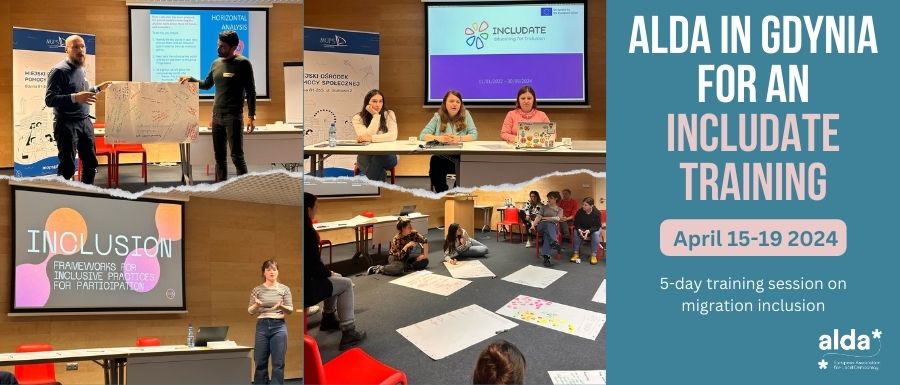From April 15 to 19, ALDA’s project managers, alongside members from Sos Malta, We Youth, and the Street Art Museum of Amsterdam (SAMA) from Amsterdam (Netherlands), were part of a transformative 5-day training journey on migration inclusion in Gdynia, Poland. At the heart of this training was the INCLUDATE curriculum, a collaborative European project engaging seven project partners: Comparative Research Network – CRN (Germany), Konkáv fro. Budapest (Hungary), Per Esempio (Italy), Crossing Borders (Denmark), Polnischer Sozialrat (Germany), Miejski Osrodek Pomocy Spolecznej – MOPS (Poland) and ALDA (France).
Designed to empower migrant associations in actively shaping inclusion and diversity strategies, the INCLUDATE project aims to cultivate inclusive communities across Europe through mutual learning
On April 15, this training started with a dinner with all the participants gathered to get to know each other, talk, exchange experiences and form bonds. As training and meetings were developing on April 16, participants engaged in interactive modules led by experts from CRN, Per Esempio, and Crossing Borders. From community mapping, Community reporting to Q methodology, these sessions provided invaluable insights into driving social change in the context of migrant people’s inclusion.
April 18 marked a hands-on day for participants, centered around “Action Plan” implementation and practical sessions. The day was structured into two main activity types: learning methods and tools, and engaging in experiential group work. This approach enabled participants to gain valuable experience in adapting these methods to their concrete cases and their countries.
Participants embarked on different visits, first to the Emigration Museum of Gdynia, then to SPILNO, an information and integration point where foreigners can find information about life, education, health and a space for integration activities. These visits proved to be inspiring and enriching experiences for all participants, offering valuable insights and fostering a deeper understanding of migration inclusion dynamics.
On April 19, the program concluded with a day dedicated to reflection. Participants came together to collectively analyse the lessons learned from the training and engage in discussions about the future trajectory of the project.
Through the INCLUDATE initiative, these five days helped empower organisations through mutual learning, and community building, echoing the project’s commitment to diversity and inclusion across Europe.
